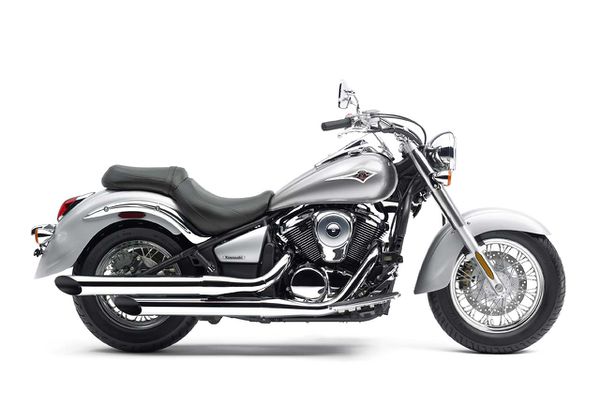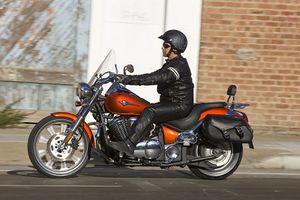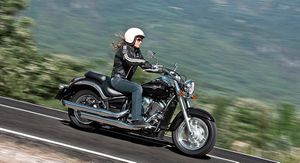Difference between revisions of "Kawasaki VN900 Vulcan"
m |
m |
||
| Line 4: | Line 4: | ||
Kawasaki VN900 Vulcan was first introduced in 2006 and is still in production today. | Kawasaki VN900 Vulcan was first introduced in 2006 and is still in production today. | ||
{{Ads_top}} | {{Ads_top}} | ||
| + | |||
| + | ''' Lineup: ''' | ||
| + | * [[Kawasaki_VN400_Vulcan | Kawasaki VN400 Vulcan]] | ||
| + | * [[Kawasaki_VN750_Vulcan | Kawasaki VN750 Vulcan]] | ||
| + | * [[Kawasaki_VN800_Vulcan | Kawasaki VN800 Vulcan]] | ||
| + | * [[Kawasaki_VN900_Vulcan | Kawasaki VN900 Vulcan]] | ||
| + | * [[Kawasaki_VN1500_Vulcan | Kawasaki VN1500 Vulcan]] | ||
| + | * [[Kawasaki_VN1600_Vulcan | Kawasaki VN1600 Vulcan]] | ||
| + | * [[Kawasaki_VN1700_Vulcan | Kawasaki VN1700 Vulcan]] | ||
| + | * [[Kawasaki_VN2000_Vulcan | Kawasaki VN2000 Vulcan]] | ||
| + | |||
The motorcycle is a cruiser of a classic layout, with a 2-cylinder V-shaped engine. Until about 2008, the Kawasaki VN 900 Vulcan was considered the largest mid-range cruiser, with only Harley-Davidson with the Softail Deluxe / Fat Boy model to be distinguished from direct competitors, but soon [[Yamaha_XVS950_Drag_Star | Yamaha V-Star 950]] , which became a direct competitor to the Kawasaki VN 900 Vulcan. | The motorcycle is a cruiser of a classic layout, with a 2-cylinder V-shaped engine. Until about 2008, the Kawasaki VN 900 Vulcan was considered the largest mid-range cruiser, with only Harley-Davidson with the Softail Deluxe / Fat Boy model to be distinguished from direct competitors, but soon [[Yamaha_XVS950_Drag_Star | Yamaha V-Star 950]] , which became a direct competitor to the Kawasaki VN 900 Vulcan. | ||
Revision as of 19:06, 12 July 2023
Kawasaki VN900 Vulcan was first introduced in 2006 and is still in production today.
Lineup:
- Kawasaki VN400 Vulcan
- Kawasaki VN750 Vulcan
- Kawasaki VN800 Vulcan
- Kawasaki VN900 Vulcan
- Kawasaki VN1500 Vulcan
- Kawasaki VN1600 Vulcan
- Kawasaki VN1700 Vulcan
- Kawasaki VN2000 Vulcan
The motorcycle is a cruiser of a classic layout, with a 2-cylinder V-shaped engine. Until about 2008, the Kawasaki VN 900 Vulcan was considered the largest mid-range cruiser, with only Harley-Davidson with the Softail Deluxe / Fat Boy model to be distinguished from direct competitors, but soon Yamaha V-Star 950 , which became a direct competitor to the Kawasaki VN 900 Vulcan.
The Kawasaki VN 900 Vulcan replaces Kawasaki VN 800 Vulcan (1995-2006) and Kawasaki VN 750 Vulcan (1984-2006). Unlike the VN800, the updated version has received a number of technical changes:
- The carburetor has been replaced with dual-throttle electronic injection;
- Rear drum brake (VN800A and VN800B) has been replaced with a disc brake;
- The rear wheel has reduced its size to 15 ', but has become wider - 180 / 70-15M / C 76H instead of 140 / 90-16 71H;
- The chain drive has been replaced by a classic, for the American market, belt drive;
- The capacity of the fuel tank has been increased from 15 to 20 liters;
- Spoked wheels remained only in classic versions, the Custom version received alloy wheels;
- A pointer fuel level indicator appeared on the dashboard;
- Despite the larger engine displacement, the maximum power was reduced to 50 hp, but the torque characteristic increased by almost 20 Nm.
- Fuel efficiency has increased - fuel consumption on the highway has decreased to 4.1 liters. The average value in the combined cycle is 4.8 liters.
The main modifications of the motorcycle:
- Kawasaki VN 900 Vulcan Classic - classic version with spoked wheels 16 '(front) and 15' (rear), foot platforms, chrome engine covers and exhaust pipes, thick seat.
- Kawasaki VN 900 Vulcan Custom - a version with alloy wheels 21 '(front) and 15' (rear), conventional footpegs, minimum chrome, single seat.
- Kawasaki VN 900 Vulcan Light Tourer (LT) - version similar to Classic + high windshield, leather side trunks and backrest for the rear seat.
- Kawasaki VN 900 Classic Special Edition (SE) - limited edition with exclusive graphic design (black and white).
The Kawasaki VN 900 Vulcan engine is a 2-cylinder V-block, liquid-cooled, 903 cc. see with electronic fuel injection, delivering 50 hp. power and 82 Nm of torque, fully available already at 3700 rpm. Since 2013, when stricter emission standards came into force, the engine has been modified to accommodate them, resulting in a maximum power output of 48 hp and a torque of 78 Nm.
The main competitors of the Kawasaki VN900 Vulcan in the class:
Photos
Specifications
Specifications Kawasaki VN900 Vulcan:
| Model | Kawasaki VN900 Vulcan |
|---|---|
| Motorcycle type | cruiser |
| Release year | 2006+ |
| Frame | steel tubular |
| Engine type | 2-cylinder, 4-stroke, V-shaped |
| Working volume | 903 cc cm. |
| Bore / Stroke | 88.0 x 74.2mm |
| Compression ratio | 9.5: 1 |
| Cooling | liquid |
| Number of valves per cylinder | SOHC, 4 valves per cylinder |
| Fuel supply system | injector, 2x 34 mm |
| Ignition type | transistor |
| Maximum power | 50.0 h.p. (37 kW) @ 5700 rpm - VN900 (2006-2012)
48.0 h.p. (35 kW) @ 5700 rpm - VN900 (2013+) |
| Maximum torque | 82 Nm (8.4 kgf * m) @ 3700 rpm - VN900 (2006-2012)
78 Nm (8.0 kgf * m) @ 3700 rpm - VN900 (2013+) |
| Gearbox | 5-speed |
| Drive type | belt |
| Front tire size | 80 / 90-21M / C 48H - VN900C Custom
130 / 90-16M / C 67H - VN900B Classic, VN900D Classic LT |
| Rear tire size | 180 / 70-15M / C 76H |
| Front brakes | 1 disc, 300 mm, 2-piston caliper |
| Rear brakes | 1 disc, 270 mm, 2-piston caliper |
| Front suspension | 41 mm telescopic Fork, travel - 150 mm |
| Rear suspension | linkage Uni-Trak with monoshock (7-stage preload adjustment), stroke - 104 mm |
| Motorcycle length | 2405mm - VN900C Custom
2465 mm - VN900B Classic, VN900D Classic LT |
| Motorcycle width | 894mm - VN900C Custom
1006 mm - VN900B Classic, VN900D Classic LT |
| Motorcycle height | 1120mm - VN900C Custom
1064 mm - VN900B Classic 1480 mm - VN900D Classic LT |
| Wheelbase | 1646 mm |
| Saddle height | 685mm - VN900C Custom
680 mm - VN900B Classic, VN900D Classic LT |
| Acceleration to 100 km / h | 5.92 sec |
| Maximum speed | 169 km / h |
| Fuel tank capacity | 20.0 l |
| Motorcycle weight (curb) | 277 kg - VN900C Custom
281 kg - VN900B Classic 298 kg - VN900D Classic LT |
Документация



